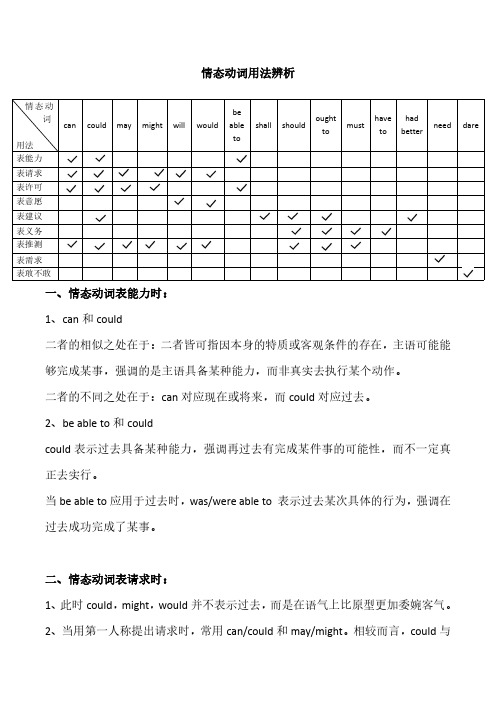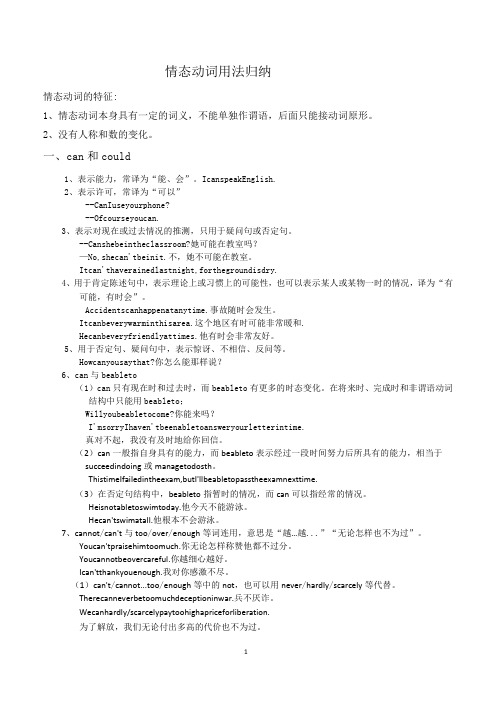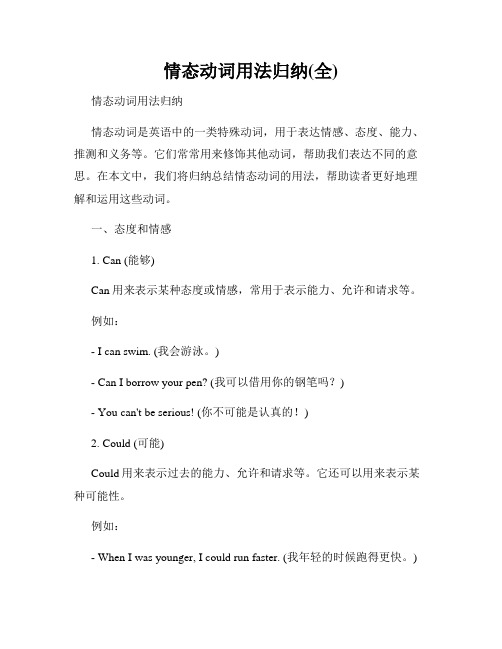英语情态动词用法总结(完整)
情态动词主要用法总结

情态动词主要用法总结情态动词是用来表示说话人的态度、情感或意愿的动词。
情态动词有can、could、may、might、shall、should、will、would、must、need 等。
以下是情态动词的主要用法总结:1.表示能力:- Can:表示一般的能力或技能,意为“能够”。
- Could:表示过去的能力或技能,意为“能够”。
2.表示许可或允许:- Can:表示一般的许可或允许,意为“可以”。
- May:表示正式的或礼貌的许可,意为“可以”。
3.表示可能性:- May:表示可能性较大,意为“可能”。
- Might:表示可能性较小,意为“可能”。
4.表示意愿或请求:- Shall:用于第一人称中,表示提议、请求或建议,意为“将”。
- Should:用于第一人称或第三人称中,表示忠告、建议或期望,意为“应该”。
- Will:用于第一人称和第三人称中,表示意愿、决心或承诺,意为“将”。
- Would:用于第一人称和第三人称中,表示客气的请求、建议或愿望,意为“将”。
5.表示必要性或推测:- Must:表示必须性或应该性,意为“必须”。
- Should:表示推测、猜测或可能性较大的必要性,意为“应该”。
6.表示时间或条件:- Will/Would:表示未来时间或条件,意为“将/将会”。
7.表示推测或假设:- Must:表示肯定的推测,意为“一定”。
- May/Might:表示可能的推测,意为“可能”。
需要注意的是,情态动词本身没有人称和数的变化,后面的动词应为原形。
另外,他们常常与动词的原形连用构成谓语,可以用于各种句型,例如肯定句、否定句、疑问句等。
14个情态动词及其用法

14个情态动词及其用法14个情态动词及其用法如下:1.can:表示能力,用于疑问句或否定句中表示惊异、怀疑、不相信等态度。
如:Can you speak English?你会说英语吗?2.could:表示过去的能力或可能性。
表示惊异、怀疑、不相信等态度时,可用could。
如:Could you have done this?你真的能做到这个吗?3.may:表示可能性。
用于请求、允许、祝愿等场合。
如:May I borr ow your book?我能借你的书吗?4.might:表示可能性,比may更委婉。
如:Might I have your attenti on,请大家注意。
5.must:表示肯定、确定,用于陈述事实或推测。
如:The game must be over,比赛应该结束了。
6.need:表示需要、必要性。
如:We need to finish this task today。
我们今天需要完成这个任务。
7.ought to:表示应该、应当,用于表示道义上的责任或推测。
如:Yo u ought to help him,你应当帮助他。
8.dare:表示勇气、敢。
如:Dare you jump off the bridge?你敢从桥上跳下去吗?9.shall:表示询问、承诺、威胁等。
如:Shall we start?我们开始吗?10.will:表示将来、意愿、决心等。
如:I will finish this work on ti me.我会按时完成这个工作。
11.had better:表示建议、警告。
如:You had better hurry,你最好快点。
12.have to:表示被迫、必须。
如:I have to go to work,我必须去上班。
ed to:表示过去经常发生的动作或状态,也可表示习惯或倾向。
如:He used to smoke,他过去经常抽烟。
14.shouldn't:表示不应该,用于否定句中表示建议、批评等。
情态动词用法总结

情态动词用法总结情态动词,又称情态助动词,是英语中一类特殊的助动词,包括can、could、may、might、must、shall、should、will、would等。
它们通常与动词原形搭配使用,用来表示说话人对动作或状态的态度、推测、许可、义务、建议等。
下面将分别从这几个方面进行总结情态动词的用法。
1. 表示能力和才能:can、could和able to都可以表示能力和才能,但用法稍有不同。
can和able to可以用来表示现在或将来的能力,而could则表示过去的能力或偶然的能力。
例如:- I can swim.(我会游泳)- She could speak three languages when she was 15.(她15岁时会说三种语言)- He was able to finish the task on time.(他能够按时完成任务)2. 表示推测和可能性:may、might和could可用来表示推测和可能性,其中may比might更常用,could表示可能性最低。
例如:- He may be at home.(他可能在家)- It might rain this afternoon.(今天下午可能会下雨)- She could be in the library.(她有可能在图书馆)3. 表示许可和禁止:can、could和may可用来表示许可,could表示客气一些。
而mustn't则表示禁止。
例如:- You can go now.(你可以走了)- Could I use your computer?(我能用一下你的电脑吗?)- You mustn't smoke here.(你不能在这里抽烟)4. 表示义务和必要性:must表示主观上的义务和必要性,常用来表示说话人的主观判断。
have to则表示客观上的必要性和强制性。
例如:- I must finish my homework tonight.(我必须今晚完成作业)- I have to get up early tomorrow.(我明天必须早起)5. 表示建议和推荐:should和ought to都表示建议或推荐,should更常用一些,ought to用得相对较少。
情态动词的用法

情态动词的用法情态动词是英语中一类特殊的动词,它们用来表示说话人的态度、意愿、能力、推测以及提出请求等。
常见的情态动词包括can, could, may, might, must, shall, should, will, would等。
它们在句子中通常与其他动词连用,来表示某种情态或者意义。
本文将详细介绍情态动词的用法。
一、推测和可能性情态动词经常用于表达对事实的推测或者可能性。
在这种情况下,情态动词常与动词原形连用。
例如:1. He can swim.(他会游泳。
)- 表示他有游泳的能力。
2. She might be busy.(她可能很忙。
)- 表示对她忙碌的推测。
二、能力和批准情态动词还可以用来表示能力、技能以及请求或批准等。
下面是一些例子:1. She can play the piano.(她会弹钢琴。
)- 表示她有弹钢琴的能力。
2. You may leave now.(你现在可以离开了。
)- 表示对你离开的允许。
三、义务和必要性情态动词也被用来表示某种义务或者必要性。
下面是一些例子:1. Students must wear uniforms.(学生必须穿校服。
)- 表示学生有义务穿校服。
2. We should recycle.(我们应该回收。
)- 表示我们有责任进行回收。
四、猜测和推测情态动词有时用于表示对过去的推测或者猜测。
比较常见的是may have和might have。
例如:1. He may have forgotten the keys.(他可能忘记带钥匙了。
)- 表示对他忘记带钥匙的猜测。
2. They might have already left.(他们可能已经离开了。
)- 表示对他们离开的推测。
五、情态动词的否定形式和疑问形式情态动词的否定形式直接在情态动词前加not,疑问形式是将情态动词放在句首。
例如:1. I can't swim.(我不会游泳。
情态动词用法归纳总结

情态动词用法辨析情态动词用法can could may might will would be able to shall should ought to must have to had better need dare表能力表请求表许可表意愿表建议表义务表推测表需求表敢不敢一、情态动词表能力时:1、can 和could二者的相似之处在于:二者皆可指因本身的特质或客观条件的存在,主语可能能够完成某事,强调的是主语具备某种能力,而非真实去执行某个动作。
二者的不同之处在于:can 对应现在或将来,而could 对应过去。
2、be able to 和couldcould 表示过去具备某种能力,强调再过去有完成某件事的可能性,而不一定真正去实行。
当be able to 应用于过去时,was/were able to 表示过去某次具体的行为,强调在过去成功完成了某事。
二、情态动词表请求时:1、此时could ,might ,would 并不表示过去,而是在语气上比原型更加委婉客气。
2、当用第一人称提出请求时,常用can/could 和may/might 。
相较而言,could 与may在表请求的问句中出现的频率最高;might表发请求的语气最为委婉客气,因此反而很少见;而can则常用于熟人间的对话中。
语气强度:can>could/might>might3、当用第二人称提出请求时,常用can/could和will/would。
其中could和would 表达请求的语气更委婉客气;而can与will则常用于熟人对话中。
语气强度:can/will>could/would三、情态动词表许可时:1、与表请求不同,will/would不论前接第几人称,都表示主语本身的意愿,无需得到他人的“许可”,所以will/would不可以用于表请求的句中。
2、can和may二者都可以表示对现在或将来动作的许可,其中can的使用频率更高。
情态动词的用法总结

情态动词的用法总结下面是小编整理的一些关于情态动词的用法总结,欢迎大家阅读!possibility: can / could, may / mightcertainty: must, will, shouldability: can / could, be able topermission: can / could, may / mightrequests: can / could, will / wouldsuggestions: could / may /might, shallnecessity: must, have to, have got to, needadvice: ought to, had better情态动词的语法特征1. 情态动词没有人称和数的变化,即情态动词第三人称单数不加- s (have to, have got to, be able to 除外)。
2. 情态动词不能表示正在发生或已经发生的事情,只表示期待或估计某事的发生。
3. 情态动词本身具有一定词义, 但意思不够完整, 不能单独做谓语, 后接动词原形一起构成谓语部分 (ought to, have to/have got to, be able to除外)。
4. 情态动词无非谓语形式,即无不定式、分词等形式。
Sum up1. can和be able to1) can (could) 表示能力、可能, 只用于现在式和过去式2) be able to可以用于各种时态。
只用be able to的情况:a. 位于助动词后。
b. 情态动词后。
c. 表示过去某时刻动作时。
d. 用于句首表示条件。
e. 表示成功地做了某事时,只能用was/ were able to,不能用could。
注意:could还可不表示时态,只表示1) 提出委婉的请求,回答中不可用could。
--- Could I have the television on?--- Yes, you can. / No, you can’t.2) 在否定、疑问句中表示推测或怀疑。
高中英语情态动词用法

情态动词用法归纳情态动词的特征:1、情态动词本身具有一定的词义,不能单独作谓语,后面只能接动词原形。
2、没有人称和数的变化。
一、can和could1、表示能力,常译为“能、会”。
IcanspeakEnglish.2、表示许可,常译为“可以”--CanIuseyourphone?--Ofcourseyoucan.3、表示对现在或过去情况的推测,只用于疑问句或否定句。
--Canshebeintheclassroom?她可能在教室吗?—No,shecan'tbeinit.不,她不可能在教室。
Itcan'thaverainedlastnight,forthegroundisdry.4、用于肯定陈述句中,表示理论上或习惯上的可能性,也可以表示某人或某物一时的情况,译为“有可能,有时会”。
Accidentscanhappenatanytime.事故随时会发生。
Itcanbeverywarminthisarea.这个地区有时可能非常暖和.Hecanbeveryfriendlyattimes.他有时会非常友好。
5、用于否定句、疑问句中,表示惊讶、不相信、反问等。
Howcanyousaythat?你怎么能那样说?6、can与beableto(1)can只有现在时和过去时,而beableto有更多的时态变化。
在将来时、完成时和非谓语动词结构中只能用beableto;Willyoubeabletocome?你能来吗?I'msorryIhaven'tbeenabletoansweryourletterintime.真对不起,我没有及时地给你回信。
(2)can一般指自身具有的能力,而beableto表示经过一段时间努力后所具有的能力,相当于succeedindoing或managetodosth。
ThistimeIfailedintheexam,butI'llbeabletopasstheexamnexttime.(3)在否定句结构中,beableto指暂时的情况,而can可以指经常的情况。
情态动词用法归纳(全)

情态动词用法归纳(全)情态动词用法归纳情态动词是英语中的一类特殊动词,用于表达情感、态度、能力、推测和义务等。
它们常常用来修饰其他动词,帮助我们表达不同的意思。
在本文中,我们将归纳总结情态动词的用法,帮助读者更好地理解和运用这些动词。
一、态度和情感1. Can (能够)Can用来表示某种态度或情感,常用于表示能力、允许和请求等。
例如:- I can swim. (我会游泳。
)- Can I borrow your pen? (我可以借用你的钢笔吗?)- You can't be serious! (你不可能是认真的!)2. Could (可能)Could用来表示过去的能力、允许和请求等。
它还可以用来表示某种可能性。
例如:- When I was younger, I could run faster. (我年轻的时候跑得更快。
)- Could I ask you a question? (我可以问你一个问题吗?)- It could rain later, so bring an umbrella. (今天后面可能会下雨,所以带上雨伞。
)3. May (可能)May常表示许可、请求和推测等。
它还可以用来表示某种可能性或希望。
例如:- May I use your phone? (我可以用一下你的手机吗?)- It may rain tomorrow. (明天可能会下雨。
)- They may arrive late. (他们可能会迟到。
)4. Might (可能)Might与may的用法类似,但表示的可能性稍微低一些。
例如:- She might be busy. (她可能很忙。
)- I might go to the party, but I'm not sure yet. (我可能会去参加派对,但我还不确定。
)二、能力和推测1. Must (必须)Must用来表示强烈的推断或必要性。
- 1、下载文档前请自行甄别文档内容的完整性,平台不提供额外的编辑、内容补充、找答案等附加服务。
- 2、"仅部分预览"的文档,不可在线预览部分如存在完整性等问题,可反馈申请退款(可完整预览的文档不适用该条件!)。
- 3、如文档侵犯您的权益,请联系客服反馈,我们会尽快为您处理(人工客服工作时间:9:00-18:30)。
C.could have avoidedD.could have been avoided
【答案】D
【解析】
【详解】
考查“情态动词+完成式”。句意:如果愤怒的女乘客和巴士司机保持冷静,这起导致15人死亡的事故本来是可以避免的。could have done“本来能做而没有做”,且句子主语The accident和谓语动词avoid之间是被动关系,结合句意可知答案为D。
5、should作为情态动词,可以用来表示有较大可能实现的猜测、推论,通常译为“可能”、“总该……吧”,相当于be expected to。例如:They should be home by now, I think.我想现在他们总该到家了吧。
6、should作为情态动词,用在由so that, for fear that, lest引导的目的状语从句和in case(that)引导的条件状语从句中,有“能够”、“可能”、“会”之意。例如:They got up early so that they should(= could/ might)catch the first bus in time.
6.One of our rules is that every student _______ wear school uniform while at school.
A.mightB.could
C.shallD.will
【答案】C
【解析】
【详解】
考查情态动词辨析。句意:我们其中一条规则要求每个学生在校期间都要穿校服。shall可以表示“命令,警告,强制要求;允诺;法律,规定要做……”,结合句意可知C正确。
must have done用法辨析
must have done:表示对过去的肯定的逻辑推测,推定某件事情、动作或状态可能在过去发生过(存在过)。
He must have been a doctor, for he knows medicine so well.他过去肯定是一位医生,他对医学如此了解。
A.WouldB.Shall
A.should theyB.they should
C.dare theyD.they dare
【答案】A
【解析】
【详解】
考查部分倒装和情态动词。句意:这位教授警告学生们,在他的课堂上,决不应该使用手机。on no account意为“决不”,否定词放在句首,句子使用部分倒装,排除B、D项;这里表示应该,故选A。
9.—________ the woman with the baby come over? We have a seat here.
—Thank you, sir. Actually I do have my seat here. But my baby likes to look out of the window.
I guess the poet would have been about twenty when she wrote her first poem.
Another worker wouldn't have acted like that.
3.It is really cold and the ground is wet; it ________ have rained last night.
中国学生的常见病句是:They...; they certainly have arrived.病句的句义是“他们当然已经到达了。”(这不是对过去的肯定推测,而是断定动作已经完成。)
4.—It’s really great to have a computer to store my photos.
He oughtn't to / shouldn't have done that.他本来就不该做那件事.(可是做了)
6.“would+have+过去分词”表示对过去的某种情况进行猜测,或本来要做某事却因某种原因未做成,通常用来说明某一情况,但不像用should或ought to那样含有责备之意。如:
3.“may / might + have +过去分词”表示对已发生的动作或存在的状态进行不肯定的推测,might的语气比may弱一点。这种结构主要用于肯定句和否定句,疑问句改用can或could。如:They may not have known it beforehand.
4.“need + have +过去分词”表示过去做了不必做或不需要做的事情,或过去做某事纯属多余。如:I needn't have bought so much wine—only five people came.
【点睛】
情态动词+ have done结构:
1.“must + have +过去分词”表示对过去发生的事情或状态进行推测,语气比较坚定,通常只用于肯定句。如:It must have rained last night,for the ground is wet.
2.“can / could + have +过去分词”表示对过去某种情况的怀疑或不确定。can和could一般用于否定句和疑问句,could的语气较can弱。如:He can't have finished the work so soon.
考查情态动词。句意:我们不应该把拥有洁净的饮用水看作是理所当然的。也许有一天,我们会用完它。shouldn't“不应该”,符合句意。needn't不必;can't不可能;won't将不。故选D。
2.The accident which left 15 people on board dead ________ if both the angry female passenger and the bus driver had kept calm.
A.mightB.must
C.canD.should
【答案】B
【解析】
【详解】
考查情态动词辨析。句意:天气很冷而且地面是湿的,昨晚一定下了雨。根据上文the ground is wet可知,“昨晚下了雨”是肯定的,故用must have done“必定做了……”表示对过去十分有把握的推测,故选B。
【点睛】
英语情态动词用法总结(完整)
一、单项选择情态动词
1.We ________ take clean drinking water for granted. One day we may run out of it.
A.needn'tB.can't
C.won'tD.shouldn't
【答案】D
【解析】
【详解】
7.It wasn’t right to me that such near neighborsnot know one another.
A.couldB.would
C析】
【详解】
考查情态动词。句意:对我来说,很不正常,如此近的邻居居然不认识。A. could可能,能够;B. would将;C. should竟然;D. might可能,也许。should作为情态动词,可以用来表示意外、惊喜或者在说话人看来是不可思议的,常常译为"竟会"、"居然",住的这么近的邻居居然不认识。表示意外,所以答案选C。
3、should作为情态动词,可以表示谦逊、客气、委婉之意,译为“可……”、“倒……”。例如:I should say that it would be better to try it again.
4、should作为情态动词,可以用来表示意外、惊喜或者在说话人看来是不可思议的.尤其在以why, who, how等开头的修辞疑问句或某些感叹句中常常译为“竟会”、“居然”。例如:How should I know it ?我怎么会知道这件事?
Somebody must have stolen the ring.肯定有人偷了这枚戒指. [该句所推断的偷窃动作发生在过去.]
The temperature must have dropped to below zero last night, because the water is frozen all over.昨夜的温度肯定降到零度以下,因为水都冻住了。
5.“should / ought to + have +过去分词”表示过去本该做某事但没做,其否定式表示过去不该做某事但做了,这种句式含有不满或责备之意,ought to的语气比should强一些。如:
You ought to / should have studied harder.你本应该更努力学习的.(但没有)
如果“must + have +过去分词”句型与by now连用,还可以表示对现在完成的动作和状态的肯定推测,但实质上还是指所推测的过去的动作。例如:
They started early this morning; they must have arrived by now.他们今晨很早就出发了,现在肯定已经到了。
—Don’t count on it too much. It ________ break down and you’d better make a copy of them.
A.mustB.can
C.shouldD.will
【答案】B
【解析】
【详解】
考查情态动词。句意:——有一台计算机来储存照片真是太棒了。——不要过度依赖它。它有时候也会出故障,你最好做一个备份。计算机出故障这是可能的事情,表示客观可能性用can。must肯定,必须;should应该;will表意愿。故B选项正确。
